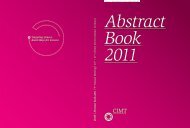Abstract Book 2010 - CIMT Annual Meeting
Abstract Book 2010 - CIMT Annual Meeting
Abstract Book 2010 - CIMT Annual Meeting
You also want an ePaper? Increase the reach of your titles
YUMPU automatically turns print PDFs into web optimized ePapers that Google loves.
057 Foerster | Cellular therapy<br />
Generation of multivirus-specific CD4+ and CD8+ T cells<br />
for adoptive immunotherapy<br />
Anna Foerster, Verena Lasmanowicz, Olaf Brauns, Sven Kramer, Petra Jekow, Wolfgang Rönspeck,<br />
Jürgen Schmitz, Mario Assenmacher, Anne Richter<br />
Department of Research & Development, Miltenyi Biotec GmbH, Bergisch Gladbach, Germany<br />
Adoptive transfer of T lymphocyte populations<br />
with specificities for several antigens is an attractive<br />
strategy for the treatment of multiple infections<br />
in immunocompromised patients or of cancer. We<br />
have established a protocol for the generation of<br />
multiantigen-specific CD4+ and CD8+ T cells<br />
using newly developed pools of peptides for in vitro<br />
T cell stimulation and a subsequent magnetic enrichment<br />
of functional T cells according to IFN-γ<br />
secretion.Peptide pools consist of synthetic peptides<br />
of mainly 15 amino acid (aa) length with 11<br />
aa overlap covering the complete antigenic protein.<br />
We have analyzed the efficiency of peptide pools<br />
compared to recombinant proteins and immunodominant<br />
HLA-A2 and –B7-restricted peptides for<br />
short-term in vitro restimulation and induction of<br />
IFN-γ in cytomegalovirus (CMV) pp65 and IE-1 specific<br />
CD4+ and CD8+ T cells derived from CMVinfected<br />
healthy blood donors.<br />
The results show that the peptide pools as well as<br />
the recombinant proteins are useful for efficient<br />
activation of CD4+ T helper cells. In contrast, efficient<br />
stimulation of CD8+ T cells is achieved only<br />
using either the overlapping 15-mer peptide pools<br />
or the immunodominant peptide epitopes of 8-10<br />
amino acids. The latter are well defined only for<br />
a limited panel of antigens and are restricted to<br />
certain HLA alleles.<br />
To test the usability of peptide pools to generate<br />
multivirus-specific T cells for adoptive immunotherapy<br />
we stimulated PBMC from leukapheresis of<br />
healthy donors with a combination of four peptide<br />
pools selected from CMV pp65 and IE-1, adenovirus<br />
(AdV) hexon, and Epstein-Barr-Virus (EBV) EBNA-1<br />
and BZLF-1 for four hours. The Large Scale IFN-γ<br />
Secretion Assay Enrichment Kit was used to magnetically<br />
enrich IFN-γ secreting T cells to a purity of<br />
>90%. Antigen specificity and functionality of the<br />
enriched T cells were controlled after expansion.<br />
Cells expanded between 4 and 745 fold within 9-14<br />
days. Expanded cells contained high frequencies<br />
of pp65495-503/A2 tetramer+ and pp65417-426/B7<br />
tetramer+ CD8+ T cells. Additionally after restimulation<br />
of the expanded cells with the mixture<br />
of peptide pools and intracellular IFN-γ staining,<br />
21-53% of CD4+ T cells and 53-87% of CD8+ T<br />
cells produced IFN-γ. Moreover comparing the stimulation<br />
of PBMC with reactivation of the T cell<br />
lines with each peptide pool separately showed that<br />
the specificity for each antigen sustained during<br />
the enrichment and expansion phase.<br />
The concomitant addition of four peptide pools increases<br />
the competition of peptides to be loaded on<br />
MHC molecules, which might decrease the efficient<br />
activation of each antigen-specific T cell. Therefore<br />
we included in our study the separation of PBMC<br />
in four samples, separate loading of the samples<br />
with one peptide pool for two hours, and recombination<br />
of PBMC for T cell stimulation for four<br />
hours. We found comparable results in the number<br />
of enriched cells, expansion rate of T cells, and the<br />
antigen-specificity of the T cell lines for concomitant<br />
and separate antigen loading.<br />
In summary, we have established a protocol for<br />
rapid in vitro generation of multivirus-specific<br />
CD4+ and CD8+ T cells using a combination of<br />
peptide pools from several antigens for restimulation<br />
and subsequent magnetic selection of IFN-γ<br />
secreting T cells.<br />
101



